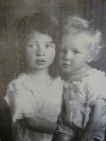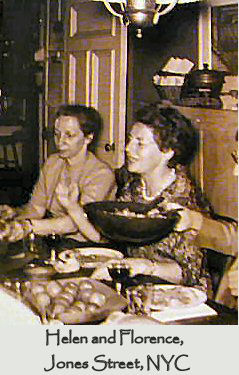 Quentin Remembers his Sister Florence
Quentin Remembers his Sister Florence
Those were the days when families went on Sunday drives for the sheer pleasure, or I should say supposed pleasure, of the drive. Florence, who was subject to car sickness, would lodge a strong protest. Since I wasnít particularly fond of Sunday drives myself, I inwardly wished her success in her endeavor, but I donít remember ever joining in. Florence could handle it. This became an enduring pattern in our young lives. In every clash of wills between our mother and ourselves, Florence led the charge and attracted the countering fire whilst my behavior generally escaped attention. In later years Florence would ruefully recall that I avoided open confrontation and got away with practically everything. This is not quite true. Yet I do owe her an unpaid debt of gratitude. She did the strenuous heavy lifting. I slipped by.
Until the fall of 1931 we grew up together, but divided by age and gender, we moved in rather different circles. Summers I swam and sailed and rowed about with the other Belle Island boys. She had other friends, other things to do. I donít remember Florence joining us. Then suddenly we went to Europe and there were no other children at all, just Florence and me. Moving about as we did from place to place from school to school we scarcely knew anyone else and never knew anyone else well. We were thrown together as few children are.
For reasons that escape me, when the snows began to fall in the autumn of 1932, I accompanied Henry and Dottie to Megeve, a haven for skiers and tubercular patients, and Florence stayed in dark and dreary Grenoble with Mom. I donít think either of us realized how much we would miss one another. When we were reunited and about to take the long bus ride down the Route Napoleon to Nice and thence on to Florence, where we spent every spring, we sat up talking all night long. We agreed then and there to stop being mean to one another, as we had often been up until then, and as far as I can remember, we stuck to the agreement. I was ten, Florence was twelve.
We studied at Miss Barryís School in Florence, a parochial school in Meudon, the Ecole Alsacienne in Paris, the summer school of the University of Vienna in Gmunden, the American Preparatory School in Munich run by enthusiastic Nazi sympathizers, the American School in Paris run by enthusiastic supporters of Franco in the Spanish Civil War. We had private lessons from a succession of tutors and teacHers. Mom helped worthy and penniless young men and women by hiring them to teach us whatever they knew, drawing, singing, piano, American history, English composition. And we staggered along. Florence was much better at algebra than I and patiently helped me to learn it. But we had a lot of fun too. There was skiing every winter and one September when we were living in Saint-Symphorien, we took bicycle rides to all of the chateaux de la Loire within our range.
We came back here in 1937 and started getting to know the homeland that we had so eagerly wanted to return to, and that we knew so little about. We were stunned to learn that our compatriots knew just as little about Europe, that part of the world that in our own estimation we knew so well.
For the first time we found ourselves going to different schools, meeting different people. Florence went to Darien High School, I went to St. Lukeís in New Canaan.

It was I who gave her away in marriage to Gordon. It was in the Harvard Chapel. At my request, they marched down the aisle to the sprightly tune of the wedding march from Act III of The Marriage of Figaro, Ecco la marcia. We became very fond of one another, the four of us. We traveled together several times and shared an apartment in Paris in 1990. Florence and I had many occasions to dredge up the memories I have been talking about and many more. We did so just a few weeks ago when I came to Hope and Mosesí house. I am deeply grateful to have seen her and talked with her before the end.
During one of those conversations she said she regretted her frequent fights with Mom. But Mom was as much a part of them as she. A readiness to disagree loudly formed a kind of bond between them, as authentic as the love that joined them. In fact, over the years as we traveled or would see Florence and Gordon in Ithaca or Maine or in Bloomington - most recently at our fiftieth wedding anniversary - I began to notice the scattered and indefinable ways in which Florence would not simply remind me of my mother but bring her to life again for a moment in my mind. I cannot see Hope and Faith from the same lifelong perspective as I do my sister and my mother, but I would be surprised if some part of Florence did not live on in them too.
 But in closing I want to go back for a moment to our return to the United States in the fall of 1937. Of all the joys of coming home none was greater that seeing our sister Helen again. We called her Honey when we were kids and we adored her and we missed her through those six years. Then, as the months went by after we got back, I began to realize something that at first bewildered me. Florence was changing. Ignorant as I was, I knew that we all change and never more than when we are in our teens. But this was something different. Florence began sounding and acting like Helen. Today they would say that Helen was her role model. The term didnít exist then and I donít much like it now. Florence loved Helen very much and wanted to be like her. She also must have discovered and fostered within Herself those traits that were like her sisterís. And those are the most lovable and admirable traits I have ever known. That boldness and resolution and quick temper that used to stun me when she was five years old did not disappear. Listening to her exchange of views with a Greek waiter a decade ago, I understood not a word, but felt on very familiar ground. But all of those qualities somehow modulated into and harmonized with her genuine, instinctive concern and affection for others, her refusal to be daunted by vexatious things, her good humor, her kindness. As if by nature she authentically cared for others. As Gordon said to me just a few weeks ago, Your sister has been a wonderful wife. All of you know she has been a wonderful mother too. And I can tell you she has been a wonderful sister. To have been her brother has been one of the lasting joys of my life.
But in closing I want to go back for a moment to our return to the United States in the fall of 1937. Of all the joys of coming home none was greater that seeing our sister Helen again. We called her Honey when we were kids and we adored her and we missed her through those six years. Then, as the months went by after we got back, I began to realize something that at first bewildered me. Florence was changing. Ignorant as I was, I knew that we all change and never more than when we are in our teens. But this was something different. Florence began sounding and acting like Helen. Today they would say that Helen was her role model. The term didnít exist then and I donít much like it now. Florence loved Helen very much and wanted to be like her. She also must have discovered and fostered within Herself those traits that were like her sisterís. And those are the most lovable and admirable traits I have ever known. That boldness and resolution and quick temper that used to stun me when she was five years old did not disappear. Listening to her exchange of views with a Greek waiter a decade ago, I understood not a word, but felt on very familiar ground. But all of those qualities somehow modulated into and harmonized with her genuine, instinctive concern and affection for others, her refusal to be daunted by vexatious things, her good humor, her kindness. As if by nature she authentically cared for others. As Gordon said to me just a few weeks ago, Your sister has been a wonderful wife. All of you know she has been a wonderful mother too. And I can tell you she has been a wonderful sister. To have been her brother has been one of the lasting joys of my life.
